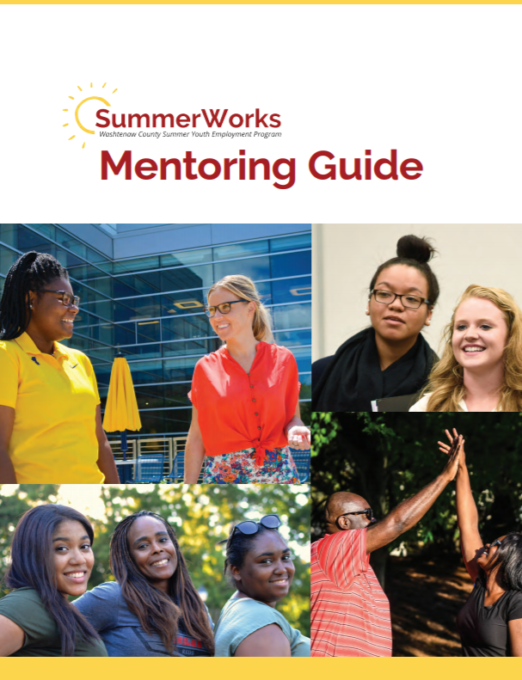Mentorship that meets the moment: SummerWorks shares lessons learned in mentoring guide

Washtenaw County’s SummerWorks team was gearing up for their fifth year of the summer youth employment program when the COVID-19 pandemic changed everything. The central feature of the program — a 10-week in-person job placement for young adults aged 16-24 — was no longer possible due to health concerns that led to business closures and restrictions on in-person gatherings.
In response, Poverty Solutions at the University of Michigan, in partnership with Michigan Works! Southeast and the Washtenaw County Office of Community and Economic Development, translated the jobs program to a virtual format to continue offering critical opportunities during a difficult time. Youth participants engaged in virtual professional development webinars, attended job shadow events, and created a professional portfolio to help them land their next job or internship.
SummerWorks also piloted a new program that paired youth with two mentors — career professionals — based on mutual interests, career field, and educational background. Participants met with their mentors at least once per week over an eight-week period throughout the summer. Eighty-three mentors participated in the pilot program and represented a broad range of industries and careers.
SummerWorks staff compiled the resources they used to develop the mentoring program in a SummerWorks Mentoring Guide, which covers topics like roles and responsibilities of mentors and mentees, stages of the mentoring relationship, best practices for mentorship, practicing cultural humility, principles of positive youth development, conversation tips, potential meeting topics, and additional activities.

Jordan Greene, SummerWorks project manager
In this Q&A, SummerWorks Project Manager Jordan Greene shares more about how the mentoring program came together and lessons learned from the pivot to virtual programming in 2020.
Before diving in to how SummerWorks changed in 2020, can you tell us more about the original concept behind the summer youth employment program?
Greene: Where you live matters for employment opportunities, access to education and training, and economic mobility. Washtenaw County is no exception, where a history of housing segregation created a landscape of inequity in access to opportunity. Structural racism disproportionately impacts communities of color in Washtenaw County, and as a result, young people often find it difficult to access training and resources that help prepare them for postsecondary education and the workforce. SummerWorks aims to address some of these inequities by connecting local young adults to resources for building professional networks, exploring career opportunities, and developing essential job and leadership skills.
Is there anything that didn’t go as expected as you launched the mentorship program this year, and how did you adapt?
Greene: We realized very quickly that both our mentors and young people would benefit from additional resources and support regarding how to structure their meetings and get the most out of their mentoring relationship. However, in our search for additional resources, we learned that there is a lack of comprehensive training and information sources for mentorship and best practices for programming. In response, our team compiled this mentoring guide in hopes that it will be beneficial to other communities and programs hoping to engage in mentorship. Moving forward, we plan to continue building out these resources for young people in our program to help them set learning goals, identify questions to ask a mentor, and exercise agency in the mentoring relationship.
What was the most surprising part of the pivot to virtual programming?
Greene: I was most surprised, and inspired, by the willingness from both our Washtenaw County and U-M communities to engage with the SummerWorks program in new ways. We received an overwhelming amount of interest in our mentoring program from professionals who represented so many different career and educational backgrounds. COVID-19 has created challenging times for folks, and I was so appreciative of our mentors’ willingness to reach out, connect with young people, and share their expertise.
Can you share an example that illustrates the impact of the program?
Greene: Whenever I think about this, one young person comes to mind. When I met them during their first year in the program, they were a shy high school student who never spoke up because they felt like they didn’t have anything meaningful or important to share. Three years later, that young person shared their story at our end-of-program celebration event in front of over 200 people. They shared a quote with me that captures why mentorship matters:
“For three years I have been proud to be in this program. It taught me something about life and I’m blessed to have been around great people. I met staff who are now great friends and mentors who care about me and my life. They have been helping me since day one when I joined the program. I also had great supervisors who guided me through everything at work. I gained confidence and help that got me to college, something I never thought I would do. I will never forget this job, my first job that I ever had.
How do you anticipate the lessons learned this year will shape the future of SummerWorks?
Greene: Last summer really helped us understand that facilitating close, supportive relationships with youth through our programming is the most important thing we do. Personally, I believe that there is power in telling our stories. Forming connections with trusted mentors who can coach us, offer resources, share their personal experiences, and connect us to resources is extremely beneficial to our development and exploration of future opportunities. “You can’t be what you can’t see” is a quote that really resonates with me, and I think that SummerWorks embodies that by promoting really immersive career exploration opportunities. I’m excited to continue carrying this philosophy forward with how we design our programming, think about expansion, and consider ways to engage youth long after the summer ends.
For more information, visit the SummerWorks website or contact Jordan Greene at joleighp@umich.edu.

